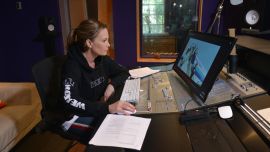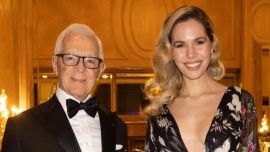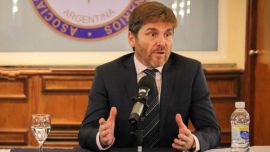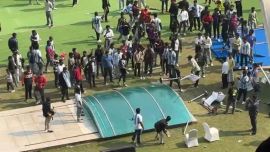Agustina Cosachov, the psychiatrist charged over the death of legendary footballer Diego Maradona, broke down in court on Thursday as she defended herself during the trial into the late Argentine’s death.
The psychiatrist directly addressed the court and medical team that treated the Maradona, saying she did “everything I could – and more” for her patient.
Cosachov stood by the decision to discharge Maradona and allow home care following brain surgery, but distanced herself from the medical provider responsible for managing residential treatment.
The healthcare professional accused the private healthcare company Swiss Medical of trying to avoid responsibility for Maradona’s care.
It was the first time any of the accused have testified since the trial began on March 11 to determine the role of Maradona’s medical team in his death.
“My role and responsibilities were in line with my profession, which is psychiatry, and I always acted with complete conviction that what I was doing was the right thing,” Cosachov told the court in San Isidro as she broke down in tears.
Maradona died on November 25, 2020, at the age of 60, while recovering at home from brain surgery for a blood clot.
His seven-person medical team is on trial for what prosecutors have described as the “horror theatre” of his care in the final days of his life, at a private residence in the Greater Buenos Aires suburb of Tigre.
Maradona died of heart failure and acute pulmonary oedema – a condition in which fluid builds up in the lungs – just weeks after undergoing surgery.
Doctors at the Clínica Olivos performed successful neurosurgery on the former footballer two weeks before he died.
Throughout the trial, both the conditions and the appropriateness of caring for Maradona at his residence have come under scrutiny. Cosachov was one of the doctors who signed off on the home care plan.
“What were the goals? Zero alcohol consumption and making sure the patient took his medication properly,” the psychiatrist told the court, referring to Maradona, who had struggled with alcohol and experienced withdrawal symptoms after surgery.
She added that home care was the only viable option due to Maradona’s temperament, and that the decision had been agreed with the family and the healthcare provider.
Cosachov testified that she had requested a general practitioner, a neurologist, and male nurses with addiction expertise to be part of the home care team. She also requested an ambulance and equipment for diagnostic tests.
A rehabilitation centre had been considered as a backup option, she claimed, alleging it was ultimately ruled out because Maradona and his family opposed compulsory admission, citing a previous bad experience.
However, she noted what she described as an “attempt to shift responsibility” by some parties.
“I now have information I didn’t have at the time. I can no longer say whether the home care plan was sound or not,” she told the judges.
Dalma Maradona, who was present in court and testified last month that her father’s death could have been avoided “if the doctors had done their jobs,” told reporters that the entire medical team was responsible.
“I don’t know if passing the buck is going to work. They were all responsible,” she told media outside the courthouse.
Several doctors testified at the start of the trial that the room where Maradona died “was very dirty and very messy” for someone who had just undergone surgery, and lacked a defibrillator or other essential medical equipment.
An executive from the private medical provider testified last month that Maradona’s entourage – including Cosachov – had requested weekly medical visits before he was transferred home.
The late footballer’s medical team – including Cosachov, Maradona’s personal doctor Leopoldo Luque, psychologist Carlos Díaz, nurse Ricardo Omar Almirón, general practitioner Pedro Pablo Di Spagna, head of nursing Mariano Perroni, and Swiss Medical coordinator Nancy Edith Forlini – are all facing charges of homicide with possible intent (dolo eventual) – pursuing a course of action despite knowing it could lead to death.
Prosecutors have named Cosachov, neurosurgeon Leopoldo Luque and psychologist Carlos Díaz as the three most seriously implicated among the accused.
They face between eight and 25 years in prison.
An eighth defendant, nurse Gisela Madrid, will be tried separately.
The trial, taking place in the Buenos Aires suburb of San Isidro, began on March 11 and is expected to continue through July.
– TIMES/PERFIL/NA


























Comments